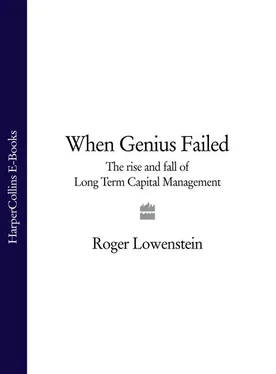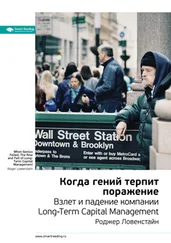Although J.M. knew his markets, his reputation as a trader was overwrought. His real skill was in shaping people, which he did in singularly understated style. He was awkward when speaking to a group; his words came out in uneven bunches, leaving others to piece together their meaning. 10But his confidence in his troops was written on his face, and it worked on their spirits like a tonic. Combined with the traders’ uncommon self-confidence, Meriwether’s faith in them was a potent but potentially combustible mix. It inflated their already supreme self-assurance. Moreover, J.M.’s willingness to bankroll Hilibrand and the others with Salomon’s capital dangerously conditioned the troops to think that they would always have access to more.
As Arbitrage made more money, the group’s turf inevitably expanded. Meriwether, eclipsing rivals such as Coats, gained command over all bond trading, including government bonds, mortgages, high-yield corporate bonds, European bonds, and Japanese warrants. It seemed logical, for the group to apply its models in new and greener pastures. But others in Salomon began to seethe. J.M. would send one of his boys—Hilibrand or Victor Haghani—to Salomon’s London office or its Tokyo office, and the emissary would declare, “This trade is very good, but you should be ten times bigger in it.” Not two times, but ten times! As if they couldn’t fail. Hilibrand and Haghani were in their twenties, and they might be talking to guys twice their age. Then they started to say, “Don’t do this trade; we’re better at this than anyone else, so we’ll do all of this trade on the arbitrage desk.”
Hilibrand was particularly annoying. He was formal and polite, but he struck old hands as condescending, infuriating them with his mathematical certitude. One time, he tried to persuade some commodity traders that they should bet on oil prices following a pattern similar to that of bond prices. The traders listened dubiously while Hilibrand bobbed his head back and forth. Suddenly he raised a hand and sonorously declaimed, “Consider the following hypothesis.” It was as if he were delivering an edict from on high, to be etched in stone.
Traders had an anxious life; they’d spend the day shouting into a phone, hollering across the room, and nervously eyeballing a computer screen. The Arbitrage Group, right in the middle of this controlled pandemonium, seemed to be a mysterious, privileged subculture. Half the time, the boys were discussing trades in obscure, esoteric language, as if in a seminar; the other half, they were laughing and playing liar’s poker. In their cheap suits and with their leisurely mien, they could seemingly cherry-pick the best trades while everyone else worked at a frenetic pace.
The group was extremely private; it seemed to have adopted J.M.’s innate secretiveness as a protective coloring. Though any trader is well advised to be discreet, the professors’ refusal to share any information with their Salomon colleagues fueled the resentment felt by Coats and others. Though Arbitrage soaked up all of the valuable tidbits that passed through a premier bond-trading floor, it set up its own private research arm and strictly forbade others in Salomon to learn about its trades. One time, the rival Prudential-Bache hired away a Salomon mortgage trader, which was considered a coup. “What was the first thing he wanted?” a then-Pru-Bache manager laughingly remembered. “Analytics? Better computer system or software? No. He wanted locks on the filing cabinet. It reflected their mentality!” Driven by fanatical loyalty to Meriwether, the Arbitrage Group nurtured an us-against-them clannishness that would leave the future Long-Term dangerously remote from the rest of Wall Street. Hilibrand became so obsessed with his privacy that he even refused to let Salomon Brothers take his picture. 11
As other areas of Salomon floundered, Arbitrage increasingly threw its weight around. Hilibrand pressed the firm to eliminate investment banking, which, he argued with some justification, took home too much in bonuses and was failing to carry its weight. Then he declared that Arbitrage shouldn’t have to pay for its share of the company cafeteria, because the group didn’t eat there. True to his right-wing, libertarian principles, Hilibrand complained about being saddled with “monopoly vendors,” as if every trader and every clerk should negotiate his own deal for lunch. The deeper truth was that Hilibrand and his mates in Arbitrage had little respect for their mostly older Salomon colleagues who worked in other areas of the firm. “It was like they were a capsule inside a spaceship,” Higgins said of J.M.’s underlings. “They didn’t breathe the air that everybody else did.”
Hilibrand and Rosenfeld continually pressed J.M. for more money. They viewed Salomon’s compensation arrangement, which liberally spread the wealth to all departments, as socialistic. Since Arbitrage was making most of the money, they felt, they and they alone should reap the rewards.
In 1987, the raider Ronald Perelman made a hostile bid for Salomon. Gutfreund feared, with ample justification, that if Perelman won, Salomon’s reputation as a trusted banker would go down the tubes (indeed, Salomon’s corporate clients could likely find themselves on Perelman’s hit list). Gutfreund fended Perelman off by selling control of the firm to a distinctly friendly investor, the billionaire Warren Buffett. Hilibrand, who weighed everything in mathematical terms, was incensed over what he reckoned was a poor deal for Salomon. The twenty-seven-year-old Wunderkind, though unswervingly honest himself, couldn’t see that an intangible such as Salomon’s ethical image was also worth a price. He actually flew out to Omaha to try to persuade Buffett, now a member of Salomon’s board, to sell back his investment, but Buffett, of course, refused.
J.M. tried to temper his impatient young Turks and imbue them with loyalty to the greater firm. When the traders’ protests got louder, J.M. invited Hilibrand and Rosenfeld to a dinner with William McIntosh, an older partner, to hear about Salomon’s history. A liberal Democrat in the Irish Catholic tradition, J.M. had a stronger sense of the firm’s common welfare and a grace that softened the hard edge of his cutthroat profession. He shrugged off his lieutenants’ occasional cries that Arbitrage should separate from Salomon. He would tell them, “I’ve got loyalty to people here. And anyway, you’re being greedy. Look at the people in Harlem.” He pressed Salomon to clean house, but not without showing concern for other departments. Thoughtfully, when the need arose, he would tell the chief financial officer, “We have a big trade on; we could lose a lot—I just want you to know.” In the crash of 1987, Arbitrage did drop $120 million in one day. 12Others at Salomon weren’t sure quite what the group was doing or what its leverage was, but they instinctively trusted Meriwether. Even his rivals in the firm liked him. And then it all came crashing down.
Pressed by his young traders, who simply wouldn’t give up, in 1989 Meriwether persuaded Gutfreund to adopt a formula under which his arbitrageurs would get paid a fixed, 15 percent share of the group’s profits. The deal was cut in secret, after Hilibrand had threatened to bolt. 13Typically, J.M. left himself out of the arrangement, telling Gutfreund to pay him whatever he thought was fair. Then Arbitrage had a banner year, and Hilibrand, who got the biggest share, took home a phenomenal $23 million. Although Hilibrand modestly continued to ride the train to work and drive a Lexus, news of his pay brought to the surface long-simmering resentments, particularly as no other Salomon department was paid under such a formula. As Charlie Munger, Buffett’s partner and a Salomon director, put it, “The more hyperthyroid at Salomon went stark, raving mad.”
Читать дальше












